Legal Aspects of Business: Authority, Agency, and Case Law Analysis
VerifiedAdded on 2023/01/19
|8
|2860
|63
Report
AI Summary
This report examines the legal aspects of business, specifically focusing on agency authority. It defines authority as the legal power to act on behalf of a business, emphasizing the principal-agent relationship. The report delves into different types of authority, including actual (express and implied) and apparent (ostensible) authority, and their implications. It explores the legal framework governing agency, including the responsibilities and liabilities of both principals and agents. The report further analyzes relevant case studies, such as Freeman and Lockyer v Buckhurst Park Properties, Ramsay James Gordon v Gary Love, Kelly v Fraser, and First Energy (UK) Ltd. V Hungarian International Bank Ltd, to illustrate the practical application of agency principles and the outcomes of disputes. The analysis covers the creation and limitations of agency relationships, the importance of authority for agents, and the circumstances under which a principal can be held liable for an agent's actions, even if the agent exceeds their authority. The report highlights the significance of understanding agency law for business operations and decision-making, ensuring that actions are legally protected and that both parties are aware of their rights and obligations.
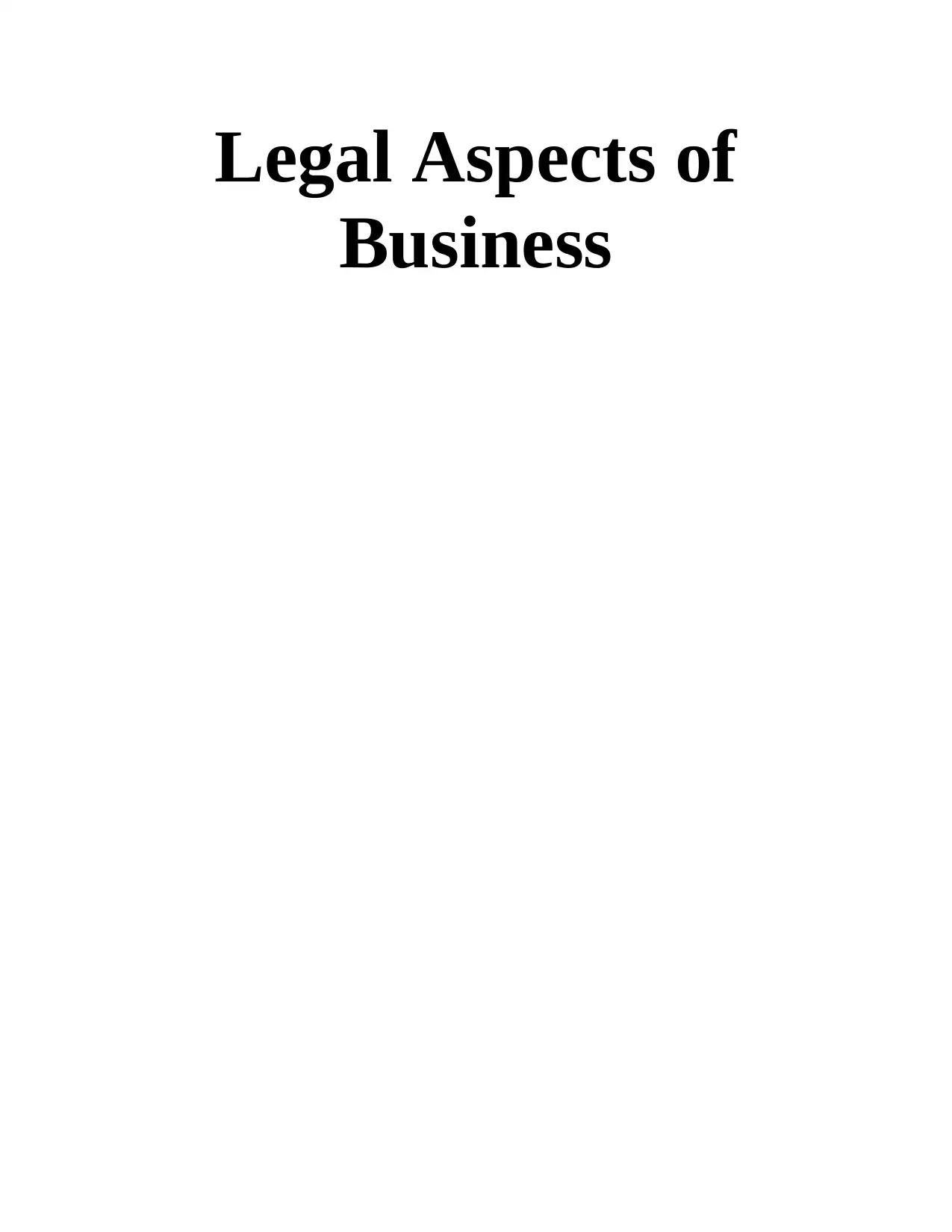
Legal Aspects of
Business
Business
Paraphrase This Document
Need a fresh take? Get an instant paraphrase of this document with our AI Paraphraser
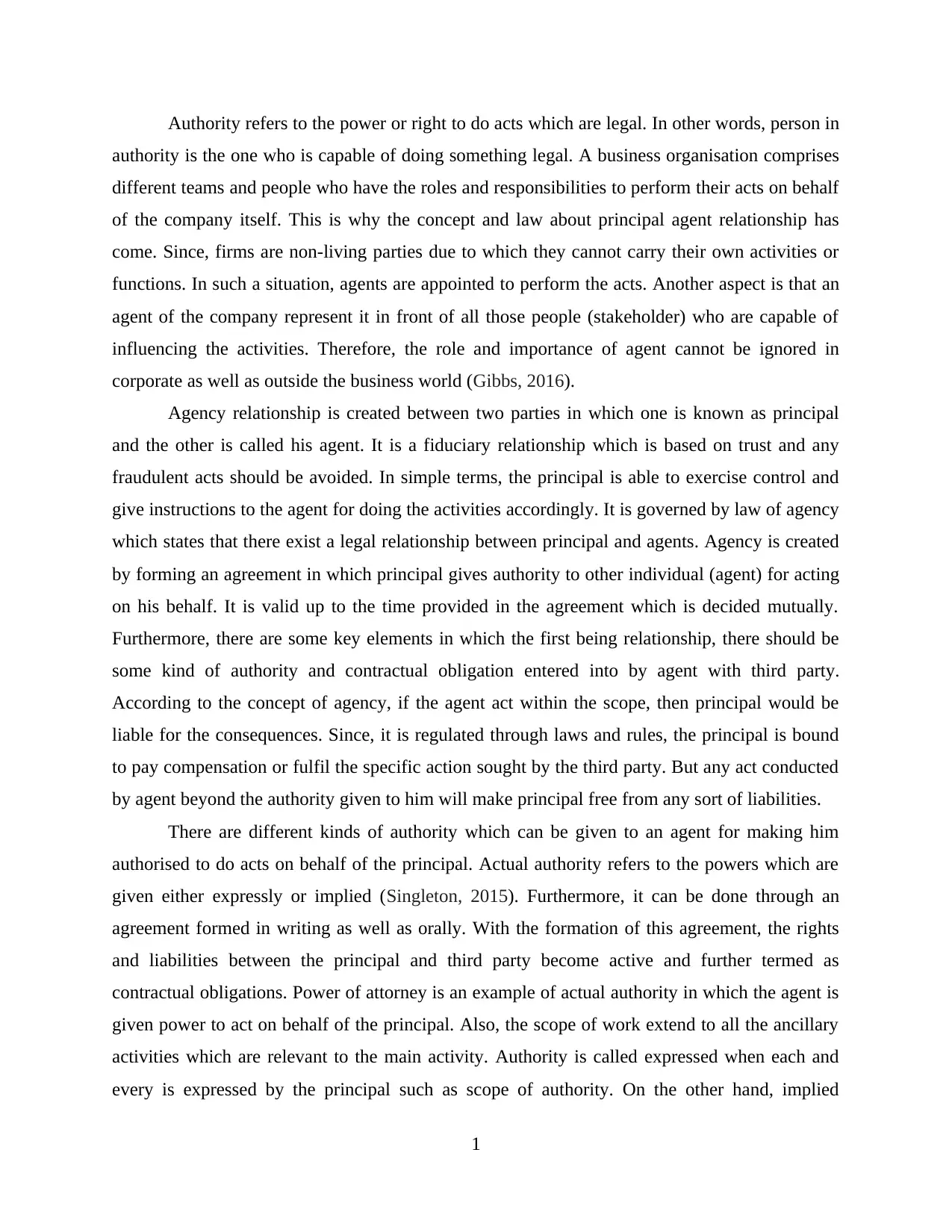
Authority refers to the power or right to do acts which are legal. In other words, person in
authority is the one who is capable of doing something legal. A business organisation comprises
different teams and people who have the roles and responsibilities to perform their acts on behalf
of the company itself. This is why the concept and law about principal agent relationship has
come. Since, firms are non-living parties due to which they cannot carry their own activities or
functions. In such a situation, agents are appointed to perform the acts. Another aspect is that an
agent of the company represent it in front of all those people (stakeholder) who are capable of
influencing the activities. Therefore, the role and importance of agent cannot be ignored in
corporate as well as outside the business world (Gibbs, 2016).
Agency relationship is created between two parties in which one is known as principal
and the other is called his agent. It is a fiduciary relationship which is based on trust and any
fraudulent acts should be avoided. In simple terms, the principal is able to exercise control and
give instructions to the agent for doing the activities accordingly. It is governed by law of agency
which states that there exist a legal relationship between principal and agents. Agency is created
by forming an agreement in which principal gives authority to other individual (agent) for acting
on his behalf. It is valid up to the time provided in the agreement which is decided mutually.
Furthermore, there are some key elements in which the first being relationship, there should be
some kind of authority and contractual obligation entered into by agent with third party.
According to the concept of agency, if the agent act within the scope, then principal would be
liable for the consequences. Since, it is regulated through laws and rules, the principal is bound
to pay compensation or fulfil the specific action sought by the third party. But any act conducted
by agent beyond the authority given to him will make principal free from any sort of liabilities.
There are different kinds of authority which can be given to an agent for making him
authorised to do acts on behalf of the principal. Actual authority refers to the powers which are
given either expressly or implied (Singleton, 2015). Furthermore, it can be done through an
agreement formed in writing as well as orally. With the formation of this agreement, the rights
and liabilities between the principal and third party become active and further termed as
contractual obligations. Power of attorney is an example of actual authority in which the agent is
given power to act on behalf of the principal. Also, the scope of work extend to all the ancillary
activities which are relevant to the main activity. Authority is called expressed when each and
every is expressed by the principal such as scope of authority. On the other hand, implied
1
authority is the one who is capable of doing something legal. A business organisation comprises
different teams and people who have the roles and responsibilities to perform their acts on behalf
of the company itself. This is why the concept and law about principal agent relationship has
come. Since, firms are non-living parties due to which they cannot carry their own activities or
functions. In such a situation, agents are appointed to perform the acts. Another aspect is that an
agent of the company represent it in front of all those people (stakeholder) who are capable of
influencing the activities. Therefore, the role and importance of agent cannot be ignored in
corporate as well as outside the business world (Gibbs, 2016).
Agency relationship is created between two parties in which one is known as principal
and the other is called his agent. It is a fiduciary relationship which is based on trust and any
fraudulent acts should be avoided. In simple terms, the principal is able to exercise control and
give instructions to the agent for doing the activities accordingly. It is governed by law of agency
which states that there exist a legal relationship between principal and agents. Agency is created
by forming an agreement in which principal gives authority to other individual (agent) for acting
on his behalf. It is valid up to the time provided in the agreement which is decided mutually.
Furthermore, there are some key elements in which the first being relationship, there should be
some kind of authority and contractual obligation entered into by agent with third party.
According to the concept of agency, if the agent act within the scope, then principal would be
liable for the consequences. Since, it is regulated through laws and rules, the principal is bound
to pay compensation or fulfil the specific action sought by the third party. But any act conducted
by agent beyond the authority given to him will make principal free from any sort of liabilities.
There are different kinds of authority which can be given to an agent for making him
authorised to do acts on behalf of the principal. Actual authority refers to the powers which are
given either expressly or implied (Singleton, 2015). Furthermore, it can be done through an
agreement formed in writing as well as orally. With the formation of this agreement, the rights
and liabilities between the principal and third party become active and further termed as
contractual obligations. Power of attorney is an example of actual authority in which the agent is
given power to act on behalf of the principal. Also, the scope of work extend to all the ancillary
activities which are relevant to the main activity. Authority is called expressed when each and
every is expressed by the principal such as scope of authority. On the other hand, implied
1
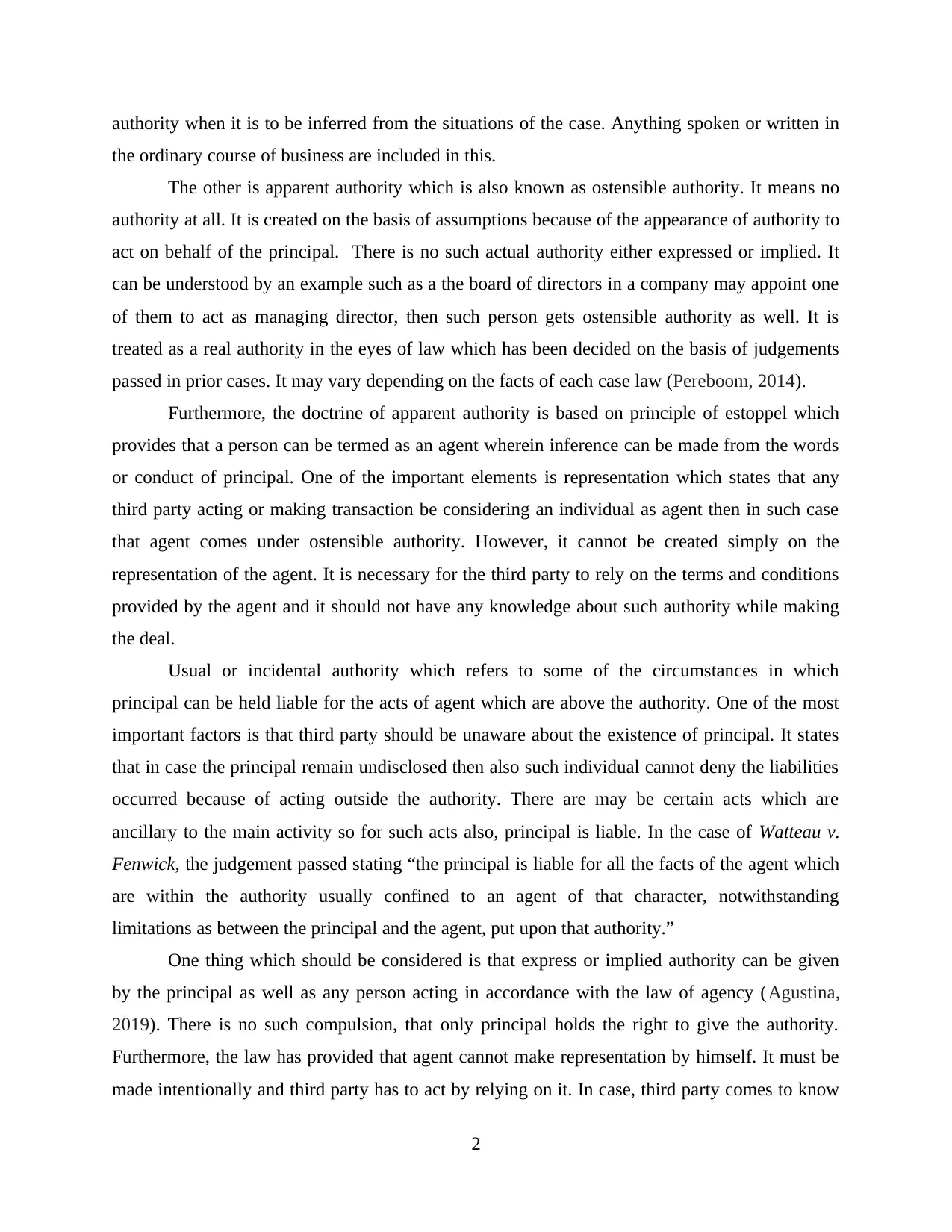
authority when it is to be inferred from the situations of the case. Anything spoken or written in
the ordinary course of business are included in this.
The other is apparent authority which is also known as ostensible authority. It means no
authority at all. It is created on the basis of assumptions because of the appearance of authority to
act on behalf of the principal. There is no such actual authority either expressed or implied. It
can be understood by an example such as a the board of directors in a company may appoint one
of them to act as managing director, then such person gets ostensible authority as well. It is
treated as a real authority in the eyes of law which has been decided on the basis of judgements
passed in prior cases. It may vary depending on the facts of each case law (Pereboom, 2014).
Furthermore, the doctrine of apparent authority is based on principle of estoppel which
provides that a person can be termed as an agent wherein inference can be made from the words
or conduct of principal. One of the important elements is representation which states that any
third party acting or making transaction be considering an individual as agent then in such case
that agent comes under ostensible authority. However, it cannot be created simply on the
representation of the agent. It is necessary for the third party to rely on the terms and conditions
provided by the agent and it should not have any knowledge about such authority while making
the deal.
Usual or incidental authority which refers to some of the circumstances in which
principal can be held liable for the acts of agent which are above the authority. One of the most
important factors is that third party should be unaware about the existence of principal. It states
that in case the principal remain undisclosed then also such individual cannot deny the liabilities
occurred because of acting outside the authority. There are may be certain acts which are
ancillary to the main activity so for such acts also, principal is liable. In the case of Watteau v.
Fenwick, the judgement passed stating “the principal is liable for all the facts of the agent which
are within the authority usually confined to an agent of that character, notwithstanding
limitations as between the principal and the agent, put upon that authority.”
One thing which should be considered is that express or implied authority can be given
by the principal as well as any person acting in accordance with the law of agency (Agustina,
2019). There is no such compulsion, that only principal holds the right to give the authority.
Furthermore, the law has provided that agent cannot make representation by himself. It must be
made intentionally and third party has to act by relying on it. In case, third party comes to know
2
the ordinary course of business are included in this.
The other is apparent authority which is also known as ostensible authority. It means no
authority at all. It is created on the basis of assumptions because of the appearance of authority to
act on behalf of the principal. There is no such actual authority either expressed or implied. It
can be understood by an example such as a the board of directors in a company may appoint one
of them to act as managing director, then such person gets ostensible authority as well. It is
treated as a real authority in the eyes of law which has been decided on the basis of judgements
passed in prior cases. It may vary depending on the facts of each case law (Pereboom, 2014).
Furthermore, the doctrine of apparent authority is based on principle of estoppel which
provides that a person can be termed as an agent wherein inference can be made from the words
or conduct of principal. One of the important elements is representation which states that any
third party acting or making transaction be considering an individual as agent then in such case
that agent comes under ostensible authority. However, it cannot be created simply on the
representation of the agent. It is necessary for the third party to rely on the terms and conditions
provided by the agent and it should not have any knowledge about such authority while making
the deal.
Usual or incidental authority which refers to some of the circumstances in which
principal can be held liable for the acts of agent which are above the authority. One of the most
important factors is that third party should be unaware about the existence of principal. It states
that in case the principal remain undisclosed then also such individual cannot deny the liabilities
occurred because of acting outside the authority. There are may be certain acts which are
ancillary to the main activity so for such acts also, principal is liable. In the case of Watteau v.
Fenwick, the judgement passed stating “the principal is liable for all the facts of the agent which
are within the authority usually confined to an agent of that character, notwithstanding
limitations as between the principal and the agent, put upon that authority.”
One thing which should be considered is that express or implied authority can be given
by the principal as well as any person acting in accordance with the law of agency (Agustina,
2019). There is no such compulsion, that only principal holds the right to give the authority.
Furthermore, the law has provided that agent cannot make representation by himself. It must be
made intentionally and third party has to act by relying on it. In case, third party comes to know
2
⊘ This is a preview!⊘
Do you want full access?
Subscribe today to unlock all pages.

Trusted by 1+ million students worldwide
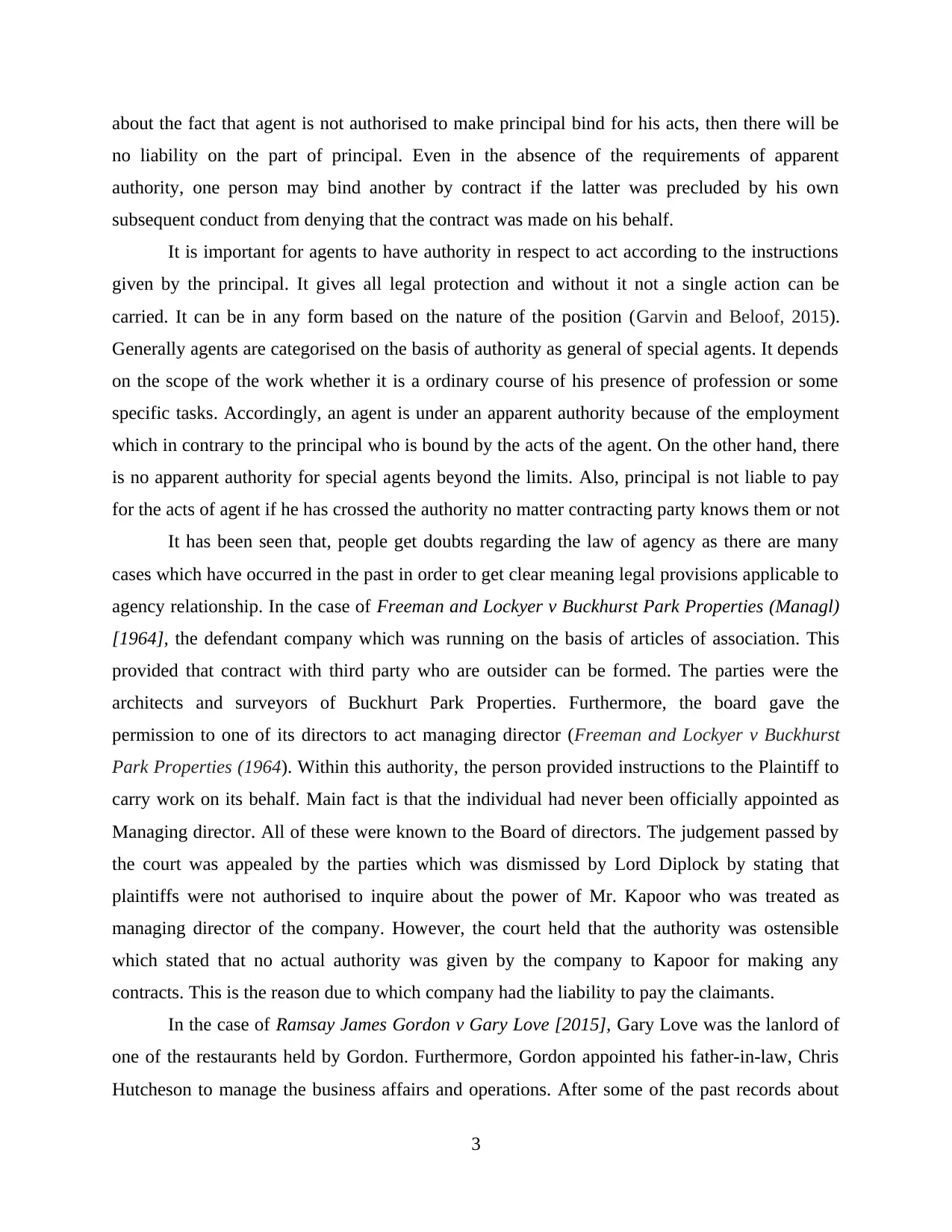
about the fact that agent is not authorised to make principal bind for his acts, then there will be
no liability on the part of principal. Even in the absence of the requirements of apparent
authority, one person may bind another by contract if the latter was precluded by his own
subsequent conduct from denying that the contract was made on his behalf.
It is important for agents to have authority in respect to act according to the instructions
given by the principal. It gives all legal protection and without it not a single action can be
carried. It can be in any form based on the nature of the position (Garvin and Beloof, 2015).
Generally agents are categorised on the basis of authority as general of special agents. It depends
on the scope of the work whether it is a ordinary course of his presence of profession or some
specific tasks. Accordingly, an agent is under an apparent authority because of the employment
which in contrary to the principal who is bound by the acts of the agent. On the other hand, there
is no apparent authority for special agents beyond the limits. Also, principal is not liable to pay
for the acts of agent if he has crossed the authority no matter contracting party knows them or not
It has been seen that, people get doubts regarding the law of agency as there are many
cases which have occurred in the past in order to get clear meaning legal provisions applicable to
agency relationship. In the case of Freeman and Lockyer v Buckhurst Park Properties (Managl)
[1964], the defendant company which was running on the basis of articles of association. This
provided that contract with third party who are outsider can be formed. The parties were the
architects and surveyors of Buckhurt Park Properties. Furthermore, the board gave the
permission to one of its directors to act managing director (Freeman and Lockyer v Buckhurst
Park Properties (1964). Within this authority, the person provided instructions to the Plaintiff to
carry work on its behalf. Main fact is that the individual had never been officially appointed as
Managing director. All of these were known to the Board of directors. The judgement passed by
the court was appealed by the parties which was dismissed by Lord Diplock by stating that
plaintiffs were not authorised to inquire about the power of Mr. Kapoor who was treated as
managing director of the company. However, the court held that the authority was ostensible
which stated that no actual authority was given by the company to Kapoor for making any
contracts. This is the reason due to which company had the liability to pay the claimants.
In the case of Ramsay James Gordon v Gary Love [2015], Gary Love was the lanlord of
one of the restaurants held by Gordon. Furthermore, Gordon appointed his father-in-law, Chris
Hutcheson to manage the business affairs and operations. After some of the past records about
3
no liability on the part of principal. Even in the absence of the requirements of apparent
authority, one person may bind another by contract if the latter was precluded by his own
subsequent conduct from denying that the contract was made on his behalf.
It is important for agents to have authority in respect to act according to the instructions
given by the principal. It gives all legal protection and without it not a single action can be
carried. It can be in any form based on the nature of the position (Garvin and Beloof, 2015).
Generally agents are categorised on the basis of authority as general of special agents. It depends
on the scope of the work whether it is a ordinary course of his presence of profession or some
specific tasks. Accordingly, an agent is under an apparent authority because of the employment
which in contrary to the principal who is bound by the acts of the agent. On the other hand, there
is no apparent authority for special agents beyond the limits. Also, principal is not liable to pay
for the acts of agent if he has crossed the authority no matter contracting party knows them or not
It has been seen that, people get doubts regarding the law of agency as there are many
cases which have occurred in the past in order to get clear meaning legal provisions applicable to
agency relationship. In the case of Freeman and Lockyer v Buckhurst Park Properties (Managl)
[1964], the defendant company which was running on the basis of articles of association. This
provided that contract with third party who are outsider can be formed. The parties were the
architects and surveyors of Buckhurt Park Properties. Furthermore, the board gave the
permission to one of its directors to act managing director (Freeman and Lockyer v Buckhurst
Park Properties (1964). Within this authority, the person provided instructions to the Plaintiff to
carry work on its behalf. Main fact is that the individual had never been officially appointed as
Managing director. All of these were known to the Board of directors. The judgement passed by
the court was appealed by the parties which was dismissed by Lord Diplock by stating that
plaintiffs were not authorised to inquire about the power of Mr. Kapoor who was treated as
managing director of the company. However, the court held that the authority was ostensible
which stated that no actual authority was given by the company to Kapoor for making any
contracts. This is the reason due to which company had the liability to pay the claimants.
In the case of Ramsay James Gordon v Gary Love [2015], Gary Love was the lanlord of
one of the restaurants held by Gordon. Furthermore, Gordon appointed his father-in-law, Chris
Hutcheson to manage the business affairs and operations. After some of the past records about
3
Paraphrase This Document
Need a fresh take? Get an instant paraphrase of this document with our AI Paraphraser
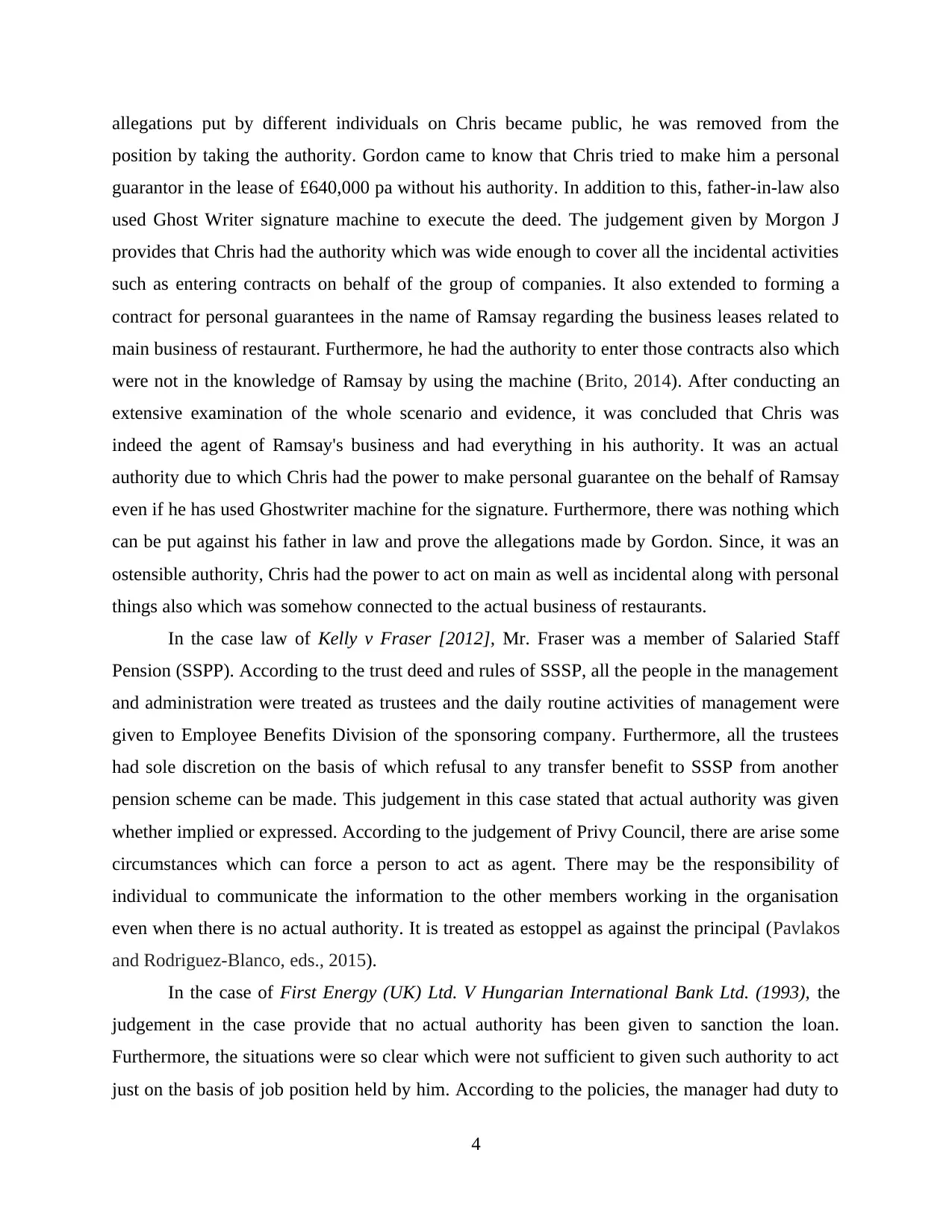
allegations put by different individuals on Chris became public, he was removed from the
position by taking the authority. Gordon came to know that Chris tried to make him a personal
guarantor in the lease of £640,000 pa without his authority. In addition to this, father-in-law also
used Ghost Writer signature machine to execute the deed. The judgement given by Morgon J
provides that Chris had the authority which was wide enough to cover all the incidental activities
such as entering contracts on behalf of the group of companies. It also extended to forming a
contract for personal guarantees in the name of Ramsay regarding the business leases related to
main business of restaurant. Furthermore, he had the authority to enter those contracts also which
were not in the knowledge of Ramsay by using the machine (Brito, 2014). After conducting an
extensive examination of the whole scenario and evidence, it was concluded that Chris was
indeed the agent of Ramsay's business and had everything in his authority. It was an actual
authority due to which Chris had the power to make personal guarantee on the behalf of Ramsay
even if he has used Ghostwriter machine for the signature. Furthermore, there was nothing which
can be put against his father in law and prove the allegations made by Gordon. Since, it was an
ostensible authority, Chris had the power to act on main as well as incidental along with personal
things also which was somehow connected to the actual business of restaurants.
In the case law of Kelly v Fraser [2012], Mr. Fraser was a member of Salaried Staff
Pension (SSPP). According to the trust deed and rules of SSSP, all the people in the management
and administration were treated as trustees and the daily routine activities of management were
given to Employee Benefits Division of the sponsoring company. Furthermore, all the trustees
had sole discretion on the basis of which refusal to any transfer benefit to SSSP from another
pension scheme can be made. This judgement in this case stated that actual authority was given
whether implied or expressed. According to the judgement of Privy Council, there are arise some
circumstances which can force a person to act as agent. There may be the responsibility of
individual to communicate the information to the other members working in the organisation
even when there is no actual authority. It is treated as estoppel as against the principal (Pavlakos
and Rodriguez-Blanco, eds., 2015).
In the case of First Energy (UK) Ltd. V Hungarian International Bank Ltd. (1993), the
judgement in the case provide that no actual authority has been given to sanction the loan.
Furthermore, the situations were so clear which were not sufficient to given such authority to act
just on the basis of job position held by him. According to the policies, the manager had duty to
4
position by taking the authority. Gordon came to know that Chris tried to make him a personal
guarantor in the lease of £640,000 pa without his authority. In addition to this, father-in-law also
used Ghost Writer signature machine to execute the deed. The judgement given by Morgon J
provides that Chris had the authority which was wide enough to cover all the incidental activities
such as entering contracts on behalf of the group of companies. It also extended to forming a
contract for personal guarantees in the name of Ramsay regarding the business leases related to
main business of restaurant. Furthermore, he had the authority to enter those contracts also which
were not in the knowledge of Ramsay by using the machine (Brito, 2014). After conducting an
extensive examination of the whole scenario and evidence, it was concluded that Chris was
indeed the agent of Ramsay's business and had everything in his authority. It was an actual
authority due to which Chris had the power to make personal guarantee on the behalf of Ramsay
even if he has used Ghostwriter machine for the signature. Furthermore, there was nothing which
can be put against his father in law and prove the allegations made by Gordon. Since, it was an
ostensible authority, Chris had the power to act on main as well as incidental along with personal
things also which was somehow connected to the actual business of restaurants.
In the case law of Kelly v Fraser [2012], Mr. Fraser was a member of Salaried Staff
Pension (SSPP). According to the trust deed and rules of SSSP, all the people in the management
and administration were treated as trustees and the daily routine activities of management were
given to Employee Benefits Division of the sponsoring company. Furthermore, all the trustees
had sole discretion on the basis of which refusal to any transfer benefit to SSSP from another
pension scheme can be made. This judgement in this case stated that actual authority was given
whether implied or expressed. According to the judgement of Privy Council, there are arise some
circumstances which can force a person to act as agent. There may be the responsibility of
individual to communicate the information to the other members working in the organisation
even when there is no actual authority. It is treated as estoppel as against the principal (Pavlakos
and Rodriguez-Blanco, eds., 2015).
In the case of First Energy (UK) Ltd. V Hungarian International Bank Ltd. (1993), the
judgement in the case provide that no actual authority has been given to sanction the loan.
Furthermore, the situations were so clear which were not sufficient to given such authority to act
just on the basis of job position held by him. According to the policies, the manager had duty to
4

communicate important information regarding application of loan to the top authorities before
sanctioning the loan. The judge passed the judgement that contract law has the motive to provide
protection innocent people from any faults which are not committed by them. It is based on
reasonable expectation rule according to which a person who is honest and has not made any
mistake should be protected against any punishments. Furthermore, if there comes a dispute
between the case issue and reasonable expectation, then court may order in-depth examination in
order to determine the application of relevant law.
In the case of Summers v Salomon [1857], the facts of the case provide that the principal
of the jewellery shop was the principal who made his nephew as agent by forming an agreement.
The agent purchased some jewellery by making orders from the supplier but all this happened
after office. After this incident, he was nowhere to be traced. The judgement provided by the
court mentioned that principal who owned a jewellery shop in which his own nephew was
appointed as an agent. The agent ordered some jewellery from the suppliers from after moving
out of the shop. Once he received the delivery, he became disappeared. According to the decision
of the case, there was apparent authority given the nephew to represent the owner. However, it
has been terminated but ostensible authority still existed. Hence, nephew was absolutely liable
for the acts own acts (Borges, 2014).
By assessing all the above facts it can be said that agency relationship is a wide concept
which allows a person to represent another. It consists of two parties which are principle (P) and
agent (A) in which the principal allows the agent to act on his behalf and make deals and carry
transactions for the benefit of the company. There is set scope along with certain powers within
which the agent has to act. All the losses and liabilities incurred are to be managed by the
principal. These cannot be denied in any case. Furthermore, the authority can be given in any
form such as implied, expressed or ostensible. Each of these have their own features and
occurrence. The agent has his scope limited to his authority which may or may not be actual.
5
sanctioning the loan. The judge passed the judgement that contract law has the motive to provide
protection innocent people from any faults which are not committed by them. It is based on
reasonable expectation rule according to which a person who is honest and has not made any
mistake should be protected against any punishments. Furthermore, if there comes a dispute
between the case issue and reasonable expectation, then court may order in-depth examination in
order to determine the application of relevant law.
In the case of Summers v Salomon [1857], the facts of the case provide that the principal
of the jewellery shop was the principal who made his nephew as agent by forming an agreement.
The agent purchased some jewellery by making orders from the supplier but all this happened
after office. After this incident, he was nowhere to be traced. The judgement provided by the
court mentioned that principal who owned a jewellery shop in which his own nephew was
appointed as an agent. The agent ordered some jewellery from the suppliers from after moving
out of the shop. Once he received the delivery, he became disappeared. According to the decision
of the case, there was apparent authority given the nephew to represent the owner. However, it
has been terminated but ostensible authority still existed. Hence, nephew was absolutely liable
for the acts own acts (Borges, 2014).
By assessing all the above facts it can be said that agency relationship is a wide concept
which allows a person to represent another. It consists of two parties which are principle (P) and
agent (A) in which the principal allows the agent to act on his behalf and make deals and carry
transactions for the benefit of the company. There is set scope along with certain powers within
which the agent has to act. All the losses and liabilities incurred are to be managed by the
principal. These cannot be denied in any case. Furthermore, the authority can be given in any
form such as implied, expressed or ostensible. Each of these have their own features and
occurrence. The agent has his scope limited to his authority which may or may not be actual.
5
⊘ This is a preview!⊘
Do you want full access?
Subscribe today to unlock all pages.

Trusted by 1+ million students worldwide

REFERENCES
Books & Journals:
Gibbs, A., 2016. Taking Agency Seriously: An Examination of Legal Integration and
Constitutionalism. In 'Integration through Law'Revisited (pp. 47-60). Routledge.
Singleton, S., 2015. Commercial agency agreements: Law and practice. Bloomsbury Publishing.
Pereboom, D., 2014. Free will, agency, and meaning in life. Oxford University Press.
Agustina, E., 2019, August. The Action of Public Law by Agency or Officer State
Administration that Violates the Law: State administrative law perspective. In First
International Conference on Administration Science (ICAS 2019). Atlantis Press.
Garvin, M. and Beloof, D.E., 2015. Crime victim agency: Independent lawyers for sexual assault
victims. Ohio St. J. Crim. L. 13. p.67.
Brito, J., 2014. Agency Threats and the Rule of the Law: An Offer You Can't Refuse. Harv. JL
& Pub. Pol'y. 37. p.553.
Pavlakos, G. and Rodriguez-Blanco, V. eds., 2015. Reasons and Intentions in Law and Practical
Agency. Cambridge University Press.
Borges, W., 2014. Understanding the Meaning of a Certified Commercial Collection Agency in
Today's Credit World. Com. L. World. 29. p.16.
Jackson, C., 2014. Structural and behavioural independence: mapping the meaning of agency
independence at the field level. International Review of Administrative Sciences. (2).
pp.257-275.
Online:
Freeman and Lockyer v Buckhurst Park Properties (1964). [Online]. Available through :<
https://swarb.co.uk/freeman-and-lockyer-v-buckhurst-park-properties-ca-1964/>.
6
Books & Journals:
Gibbs, A., 2016. Taking Agency Seriously: An Examination of Legal Integration and
Constitutionalism. In 'Integration through Law'Revisited (pp. 47-60). Routledge.
Singleton, S., 2015. Commercial agency agreements: Law and practice. Bloomsbury Publishing.
Pereboom, D., 2014. Free will, agency, and meaning in life. Oxford University Press.
Agustina, E., 2019, August. The Action of Public Law by Agency or Officer State
Administration that Violates the Law: State administrative law perspective. In First
International Conference on Administration Science (ICAS 2019). Atlantis Press.
Garvin, M. and Beloof, D.E., 2015. Crime victim agency: Independent lawyers for sexual assault
victims. Ohio St. J. Crim. L. 13. p.67.
Brito, J., 2014. Agency Threats and the Rule of the Law: An Offer You Can't Refuse. Harv. JL
& Pub. Pol'y. 37. p.553.
Pavlakos, G. and Rodriguez-Blanco, V. eds., 2015. Reasons and Intentions in Law and Practical
Agency. Cambridge University Press.
Borges, W., 2014. Understanding the Meaning of a Certified Commercial Collection Agency in
Today's Credit World. Com. L. World. 29. p.16.
Jackson, C., 2014. Structural and behavioural independence: mapping the meaning of agency
independence at the field level. International Review of Administrative Sciences. (2).
pp.257-275.
Online:
Freeman and Lockyer v Buckhurst Park Properties (1964). [Online]. Available through :<
https://swarb.co.uk/freeman-and-lockyer-v-buckhurst-park-properties-ca-1964/>.
6
Paraphrase This Document
Need a fresh take? Get an instant paraphrase of this document with our AI Paraphraser

7
1 out of 8
Related Documents
Your All-in-One AI-Powered Toolkit for Academic Success.
+13062052269
info@desklib.com
Available 24*7 on WhatsApp / Email
![[object Object]](/_next/static/media/star-bottom.7253800d.svg)
Unlock your academic potential
Copyright © 2020–2026 A2Z Services. All Rights Reserved. Developed and managed by ZUCOL.





